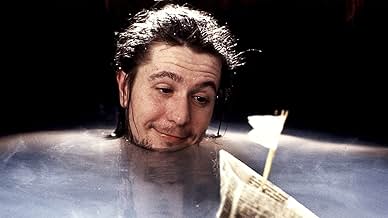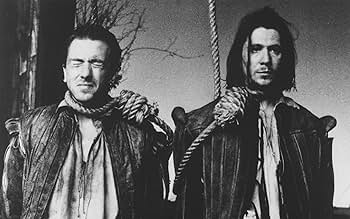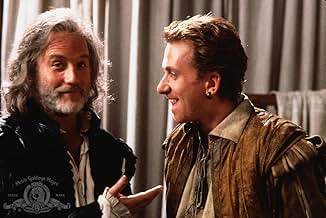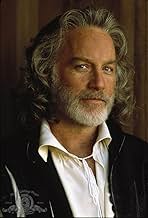Two minor characters from the play 'Hamlet' stumble around unaware of their scripted lives and unable to deviate from them.Two minor characters from the play 'Hamlet' stumble around unaware of their scripted lives and unable to deviate from them.Two minor characters from the play 'Hamlet' stumble around unaware of their scripted lives and unable to deviate from them.
- Awards
- 3 wins & 2 nominations total
Serge Soric
- Tragedian
- (as Srdjan Soric)
Sven Medvesek
- Laertes
- (as Sven Medvesck)
- Director
- Writer
- All cast & crew
- Production, box office & more at IMDbPro
Storyline
Did you know
- TriviaOriginally, the two leads (who appropriately spend the movie mixing up their own names) were cast the other way around.
- GoofsThroughout the movie there are scenes where day suddenly changes to night and vice versa. This is a running gag of Tom Stoppard plays which often have "time jumps" written into the stage directions.
- Quotes
Rosencrantz: Do you think Death could possibly be a boat?
Guildenstern: No, no, no... Death is "not." Death isn't. Take my meaning? Death is the ultimate negative. Not-being. You can't not be on a boat.
Rosencrantz: I've frequently not been on boats.
Guildenstern: No, no... What you've been is not on boats.
- ConnectionsEdited into Catalogue of Ships (2008)
Featured review
This film is one of the most glorious and intriguing examples of modern cinematic art I have ever encountered. I am not going to run you through the entire movie, as that has been done several times on here already, but I would like to clear up a few misunderstandings and harsh words that I have read in previous comments.
First and foremost, I have not seen or read the play (although I am looking forward to it) and I was perfectly able to understand all of the so-called "high-brow" concepts like fate, time, freewill, self-awareness, and the light peppering of existential musings (my favorite of which is the "...well at least I'm not dead." speech). The first time I watched this film I was very fascinated, amused, and slightly confused. These Pythoneon nonsensical scenes that some of you are reffering to were a bit difficult to understand, but after a second viewing they all made perfect sense. It does not take a genius to see the multiple layers and metaphors being used in this film. As for being totally lost without first seeing the play, that is rediculous. It took a bit of thinking and rewinding, but it is comprehensible, and after you figure it all out for yourself it is very rewarding and adds to the enjoyment, and genius, of the film. For example, the first time i watched this movie I was very confused by the pages of manuscript randomly floating around after R&G encounter the players for the first time. But once you realize that the lead player is fully self-aware, has been through these scenarios (the play "Hamlet") several times with a full consciousness and memory of the events (demonstrated rather obviously by his full knowledge of future events, the play that his troupe rehearses in front of R&G wich is an exact copy of "Hamlet", etc.) it makes for a wonderful metaphor demonstrating what has happened to the original play (Hamlet) now that some of its more flat characters are starting to think outside the script, so to speak, and become a bit more round.
Well, I could go on forever about this masterpiece, and maybe I will at a later date, but for now I just wanted you know that this film is anything but simple. If you can manage to put a little thought into what you are seeing and hearing you will find that it is perhaps the most complex, multi-layered, intuitively rewarding film ever created.
P.S. I am afraid this film is not widely accessible to the majority of movie watchers, which really saddens me because it is truly an amazing work of art. I would very much like to remedy this. So, if you have watched this movie at least 2 times, and are still puzzled by some of the scenes, please feel free to email me and I would be happy to explain anything that might heighten your understanding of the film.
First and foremost, I have not seen or read the play (although I am looking forward to it) and I was perfectly able to understand all of the so-called "high-brow" concepts like fate, time, freewill, self-awareness, and the light peppering of existential musings (my favorite of which is the "...well at least I'm not dead." speech). The first time I watched this film I was very fascinated, amused, and slightly confused. These Pythoneon nonsensical scenes that some of you are reffering to were a bit difficult to understand, but after a second viewing they all made perfect sense. It does not take a genius to see the multiple layers and metaphors being used in this film. As for being totally lost without first seeing the play, that is rediculous. It took a bit of thinking and rewinding, but it is comprehensible, and after you figure it all out for yourself it is very rewarding and adds to the enjoyment, and genius, of the film. For example, the first time i watched this movie I was very confused by the pages of manuscript randomly floating around after R&G encounter the players for the first time. But once you realize that the lead player is fully self-aware, has been through these scenarios (the play "Hamlet") several times with a full consciousness and memory of the events (demonstrated rather obviously by his full knowledge of future events, the play that his troupe rehearses in front of R&G wich is an exact copy of "Hamlet", etc.) it makes for a wonderful metaphor demonstrating what has happened to the original play (Hamlet) now that some of its more flat characters are starting to think outside the script, so to speak, and become a bit more round.
Well, I could go on forever about this masterpiece, and maybe I will at a later date, but for now I just wanted you know that this film is anything but simple. If you can manage to put a little thought into what you are seeing and hearing you will find that it is perhaps the most complex, multi-layered, intuitively rewarding film ever created.
P.S. I am afraid this film is not widely accessible to the majority of movie watchers, which really saddens me because it is truly an amazing work of art. I would very much like to remedy this. So, if you have watched this movie at least 2 times, and are still puzzled by some of the scenes, please feel free to email me and I would be happy to explain anything that might heighten your understanding of the film.
- destronjin
- Jun 3, 2002
- Permalink
Details
- Release date
- Countries of origin
- Language
- Also known as
- Rosencrantz und Güldenstern sind tot
- Filming locations
- Production companies
- See more company credits at IMDbPro
Box office
- Gross US & Canada
- $739,104
- Opening weekend US & Canada
- $24,004
- Feb 10, 1991
- Gross worldwide
- $739,104
- Runtime1 hour 57 minutes
- Color
- Aspect ratio
- 1.85 : 1
Contribute to this page
Suggest an edit or add missing content

Top Gap
By what name was Rosencrantz & Guildenstern Are Dead (1990) officially released in India in English?
Answer














